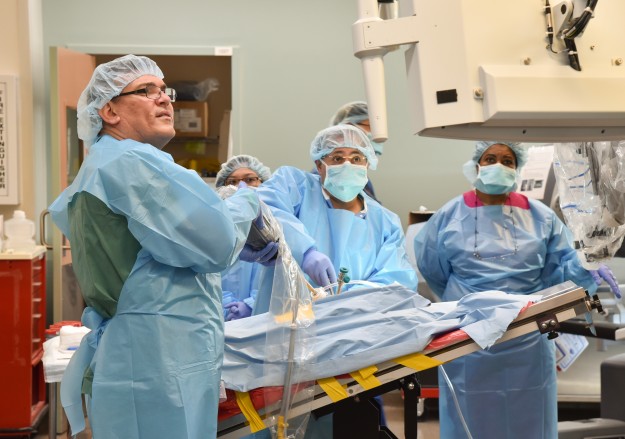Health care is a competitive business. Hospitals often invest in their clinical programs as a way to distinguish themselves in an increasingly tough marketplace.
Hospitals offer clinical programs, such as emergency services, to compete directly for patients. Others use some services as a stepping stone leading to other in-demand care, for example, launching cardiac catheterization before opening heart surgery units. Hospitals also use their reputation around certain clinical programs as a way to attract top physicians who will help meet the health care needs of more patients.
Standout programs that meet both acute and preventive needs have become a necessity for any leading health system. Johns Hopkins Medicine International (JHI) helps our affiliates develop and manage quality and clinical care programs to stay competitive for the long term.
Since opening The Johns Hopkins Hospital in 1889 and welcoming the first class in the school of medicine four years later, our organization has been revolutionizing clinical practice in the United States and securing a reputation for delivering high-quality care.
In the early 1900s, Johns Hopkins pioneered the field of neurosurgery and performed the first successful operations for brain tumors. Our Heart and Vascular Institute performed the first positive “blue baby operation” in 1944 to correct congenital heart defects. Our kidney transplant program, established in 1968, was one of the first in the nation, and in 2002 we developed a method for transplanting kidneys between incompatible donors and recipients. We opened the Bloomberg~Kimmel Institute for Cancer Immunotherapy in 2016 to help in the fight against cancer.
JHI pulls from 128 years of expertise at Johns Hopkins to support leading health providers, governments and educational institutions around the world as they strive to offer local options for the care their patients need.
Through peer-to-peer, physician-to-physician and hospital-to-hospital collaborations, we help to improve global access to high-quality health care by creating comprehensive clinical programs. We bring together teams of clinical and administrative experts from The Johns Hopkins Hospital, School of Medicine, School of Nursing and School of Public Health to work with our international affiliates in a number of areas, including:
- Medical program design—helping to design and implement medical programs based on target populations, internal capabilities, the overarching health care environment and the affiliate’s overall strategy
- Clinical program evaluation—assessing the organization’s structure and culture, including reporting relationships, resource needs, and credentialing of clinical staff and management
- Best practice guidelines—sharing knowledge and developing safe and effective operations
- Patient care pathways—analyzing data to develop care plans that integrate seamlessly with primary and follow-up care
- Workflow protocols—reviewing and enhancing current operations to manage an efficient and cost-effective department
With each of these services, our experts provide our affiliates with customized approaches, ensuring the sustainability of the work—even after our formal agreement expires.
Cases in Point
JHI is helping Fundación Santa Fe de Bogotá (FSFB), our affiliate in Colombia, to address stroke, the No. 2 cause of death in many Central and South America countries, according to the World Health Organization.
Since 2013, we have worked with FSFB to create a primary stroke center. Through assessments, observerships there and here, pilot projects, conferences, educational courses and many other joint initiatives, FSFB now has the first and only stroke center in Spanish-speaking South America (excluding Brazil) that is accredited by the Joint Commission International. The center treated 210 stroke patients in 2016 alone.
In Saudi Arabia, we collaborated with our partner Johns Hopkins Aramco Healthcare (JHAH) to introduce the very latest robotic surgery so patients there can now receive minimally invasive urologic treatments with shorter hospital stays and less pain during recovery.
We recommended and facilitated the purchase of the technologically advanced da Vinci robotic system, and we provided collaborative training for a JHAH team in Baltimore. During the training, JHAH team members observed 16 robotic surgery cases at The Johns Hopkins Hospital and completed two surgical labs in the hospital’s Minimally Invasive Surgical Training and Innovation Center.
Our affiliate HCL Healthcare is helping to spread the concept of primary care in India by developing five clinics, led by a corps of dedicated HCL practitioners and Johns Hopkins mentors.
To ensure their patients receive the same level of quality care across the network, HCL clinicians are standardizing their practice. They identified 10 high-priority disease areas—including asthma, chronic diarrhea, and anxiety and depression—and a physician leader for each. The physicians develop clinical pathways specific to the condition, collaborate with a Johns Hopkins mentor to refine their work, then train other HCL physicians on the new standard.
Wherever we work with our partners to develop clinical programs, our goal remains the same: to increase options for local, high-quality care, so more people can stay well and receive care close to home when they need it.
